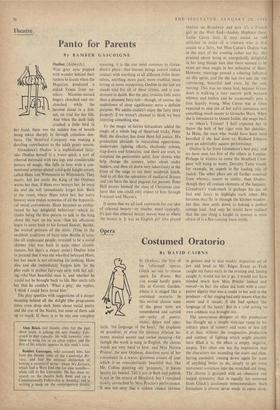Theatre
Panto for Parents
By BAMBER GASCOIGNE Ondine. (Aldwych.) Wise grey eyes popped with wonder behind their rimless bi-focals when the Magician produced a naked Venus from no- where. Nicotine-stained fingers clenched and un- clenched while the heroine stood in a fish- net, on trial for her life.
And when the dark lady crushed a little bird in her hand, there was the sudden hiss of breath being taken sharply in through countless den- tures. The Stratford Company was making a dazzling contribution to the adult panto season.
Giraudoux's Ondine is a sophisticated fairy- tale. Ondine herself is a water spirit, a sort of ethereal mermaid with two legs and considerable powers of magic. She falls in love with a con- ventional armour-plated solid-gold knight-errant, called Hans von Wittenstein zu Wittenstein. They marry, but her uncle the King of the Ondines warns her that, if Hans ever betrays her, he must die and she will immediately forget him. Back at the court, where Hans takes her, her naïve honesty soon makes nonsense of all the hypocriti- cal social conventions. Hans becomes so embar- rassed by her delightful behaviour—which in- cludes being the first person to talk to the king about the wart on his nose—'that his affections begin to stray back to his former fiancee, Bertha, the wicked princess of the story. (True to the snobbish traditions of fairy-tales Bertha is soon, like all unpleasant people, revealed to be a social climber who was born in quite other circum- stances, but that's a minor point.) Ondine tries to pretend that it was she who first betrayed Hans, but her uncle is not all-seeing for nothing. Hans dies and she immediately forgets him. So the play ends in perfect fairy-tale style with her ask- ing who 'that beautiful man is, and whether he could not be brought back to life. Her uncle tells her that he couldn't. 'What a pity,' she replies, 'I think l could have loved him.'
The play sparkles with suggestions of a deeper meaning behind all the delight (the programme notes even drop dark hints about racial purity and the rise of the Nazis), but none of them add up to much. If there is to be any one complete meaning, it is the one most common to Girau- doux's plays—that human beings cannot endure contact with anything at all different frOm them- selves, anything more pure, more truthful, more loving or more mysterious. Ondine in the last act stands trial for all of these crimes, and is con- demned to death. But the play 'remains little more than a pleasant fairy-tale—though, of course, the undertones of deep significance serve a definite purpose. We adults couldn't enjoy the fairy story properly if we weren't allowed to think we were enjoying something else.
To the magic of fairies Giraudoux added the magic of a whole bag of theatrical tricks. Peter Hall, the director, has done them full justice. His production abounds in miraculous apparitions, underwater lighting effects, electronic echoes, trap-doors and fountains; and there are even, to complete the pantomime spirit, four clowns who help change the scenery, totter about under ladders, and then sit down very laboriously at the front of the stage to eat their sandwich lunch. Add to all this the splendour of mediaeval dresses and you have the ideal pageant for parents. Peter Hall proves himself the class of Christmas con- juror that one could only expect to hire through Fortnum and Mason's.
It seems that we all look eastwards for our idea of ethereal beauty—or maybe, more cynically, it's just that ethereal beauty moves west to where the money is. It was an English girl who played Ondine on Broadway and now it's a French girl in the West End—Audrey Hepburn there, Leslie Caron here. It may sound an odd-' criticism to make of a creature who is first- cousin to a fairy, but Miss Caron's Ondine was at the start of the evening rather too fey. She pranced about being so energetically delightful in her long blonde hair that there seemed to be , more art than magic in her seduction of Hans. However, marriage proved a sobering influence on this sprite, and for the last two acts she was convincing, beautiful and even, by the end, moving. This was no mean feat, because Girau- doux is walking a very narrow path between whimsy and bathos and he occasionally puts a foot heavily wrong. Miss Caron was at times expected to step out of her naive innocence into something much nearer to Groucho Marx. When she is introduced to Queen Isolde, she snaps back —so where's Tristan? I half expected her to throw the butt of her cigar over her shoulder. As Hans, the man who would have been most horrified if she had done so, Richard Johnson gave an admirably square performance.
Ondine is far from Giraudoux's best play, and we have seen too few of the others in London. Peihaps in winters to come the Stratford Com- pany will bring us more; Dorothy Tutin would, for example, be superb in the leading role of - Judith. The other plays are all further removed from whimsy, nearer to reality, than Outline, though they all contain elements of the fantastic. Giraudoux's trade-mark is perhaps his use of fact and fancy to highlight each other. His heroines may fly in through the kitchen window, •• but they then settle down to baking a perfect • cottage loaf. And only he would have realised that the one thing a knight in armour is most afraid of is a flea running loose inside.


































 Previous page
Previous page